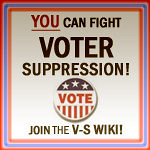Live from Madison this Sunday: social network activism and the Voter Suppression Wiki
 I’ll be appearing on John Quinlan and Harry Waisbren’s show Forward Forum this Sunday from 8-9 CDT, on the air in Madison and streamed live at WTDY. I met Harry working on Get FISA Right, and so we’ll be discussing social network activism in general, looking at some of the experiences I discuss in Reflections and Cognitive diversity and the US 2008 Election. With the election right around the corner, though, we’ll probably be devoting the bulk of our time to election protection projects, including Twitter Vote Report and the Voter Suppression Wiki; and Harry will set this in the broader context of Beyond Iraq: A Time to Break Silence.
I’ll be appearing on John Quinlan and Harry Waisbren’s show Forward Forum this Sunday from 8-9 CDT, on the air in Madison and streamed live at WTDY. I met Harry working on Get FISA Right, and so we’ll be discussing social network activism in general, looking at some of the experiences I discuss in Reflections and Cognitive diversity and the US 2008 Election. With the election right around the corner, though, we’ll probably be devoting the bulk of our time to election protection projects, including Twitter Vote Report and the Voter Suppression Wiki; and Harry will set this in the broader context of Beyond Iraq: A Time to Break Silence.
Madison is a hotbed of activism and this show has a solid following, so one thing we’re going to try to do is use this appearance to galvanize the cyber-brainstorming on the wiki, collecting good ideas and sparking connections during the show. It’ll also be a great chance to highlight what every voter can do — see Baratunde Thurston’s 12 Ways To Safeguard Your Vote In Under 10 minutes — and give an update on our North Carolina action alert.
In short it should be entertaining, interesting, and useful. Not sure about the details, but there may well be an opportunity for callins or perhaps a live chat — if not during the show, then after. Harry will be getting a blog post with more details up on MadProgress … so please, tune in!

 Debbie Stone: Do you think it’s over?
Debbie Stone: Do you think it’s over?